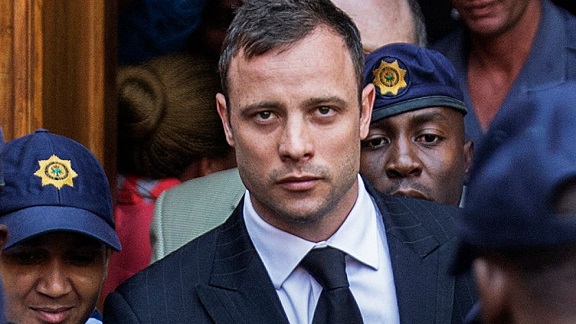Former sporting superstar Oscar Pistorius might be the most famous killer in the world.
The former Paralympic champion will leave prison in South Africa on Friday on parole, having served half of his more than 13-year sentence for murdering his girlfriend Reeva Steenkamp on Valentine's Day 2013.
The twists and turns of his trial nearly a decade ago captivated the nation - and his release is a massive news event here in South Africa and around the world.
The double amputee won six gold medals over three Paralympic Games and made history in 2012 by becoming the first amputee sprinter to compete at the Olympics, in London.
But Pistorius is now known as a convicted murderer.
He is not a celebrity seeking a comeback after falling out of fashion or battling person demons.
His career as an athlete is over. Brands will not want to sponsor him. He will not be sought out as a sports commentator.
The 37-year-old, once dubbed "the Blade Runner", is said to look physically very different from the athlete people remember.
His sentence will only expire in 2029. Until then, he will be subject to conditions and can be returned to prison if he breaches them.
Requirements include being home at set times each day, attending mandatory programmes, and not being allowed to consume alcohol or prohibited drugs.
Like other people on parole in South Africa, he will be banned from conducting media interviews.
But his high profile makes the release unusual.
In recent times, much public debate and commentary has emphasised the need to focus on victims of crime, rather than perpetrators.
Usually, when a person is convicted of murder after trial, the killer's account - which might have been very distressing for the victim's family - typically fades from public discourse, with the killer often hidden from sight in prison for decades.
In this case the killer is world famous and being released while still in his late 30s, after less than eight years in prison.
Ms Steenkamp, a law graduate and successful model, had her future taken aged only 29.
The ban on media interviews for Pistorius will eventually expire and he will then be free to speak. His fame means he will find a platform.
Gwyn Guscott, Ms Steenkamp's close friend, says "every time we start processing and coming to terms with things, Oscar pops up".
She predicts he will eventually seek to use the media attention to once again tell his version of events.
"Him coming out and speaking to the public, and possibly, you know, triggering one of our emotions in the wrong way, it's just going to set us all backwards."
In a statement read to his parole hearing last November, Ms Steenkamp's mother, June, said she did not believe Pistorius had been rehabilitated.
Nor did she believe his story claiming he thought her daughter was an intruder on the night he shot her.
"I do not know anybody who does," June Steenkamp added.
She said "rehabilitation requires someone to engage honestly with the full truth of his crime and the consequences thereof.
"Nobody can claim to have remorse if they are not able to engage fully with the truth. If someone does not show remorse, they cannot be considered to be rehabilitated."
June Steenkamp's husband Barry died last year. She says he did so because of a "broken heart" caused by his daughter's death.
The release of Pistorius, and the potential it creates for future publicity for him, will not be welcomed by the Steenkamp family.
In South Africa, you do hear different views on the case, with people in the same social circles or families expressing vastly differing views on his culpability.
Some forget he was convicted of murder on appeal, remembering the original conviction of culpable homicide, a lesser offence equivalent to manslaughter, and people's memories of the evidence have inevitably faded.
Under South African law, all offenders are entitled to be considered for parole once they have served half their total sentence.
But Bulelwa Adonis, of South African campaign group Women for Change, says his early release reveals a "normalisation of leniency when it comes to predators, when it comes to anyone who commits any kind of femicide or gender-based violence".
She feels the fact that he was once a national hero still colours some people's perceptions.
"I think it is high time we challenge ourselves to actually perceive this person for what they've done," Ms Adonis says.
For Ms Guscott the position is clear. Since her friend Reeva Steenkamp was "brutally murdered" in 2013, she "hasn't had one second to rest in peace correctly".





